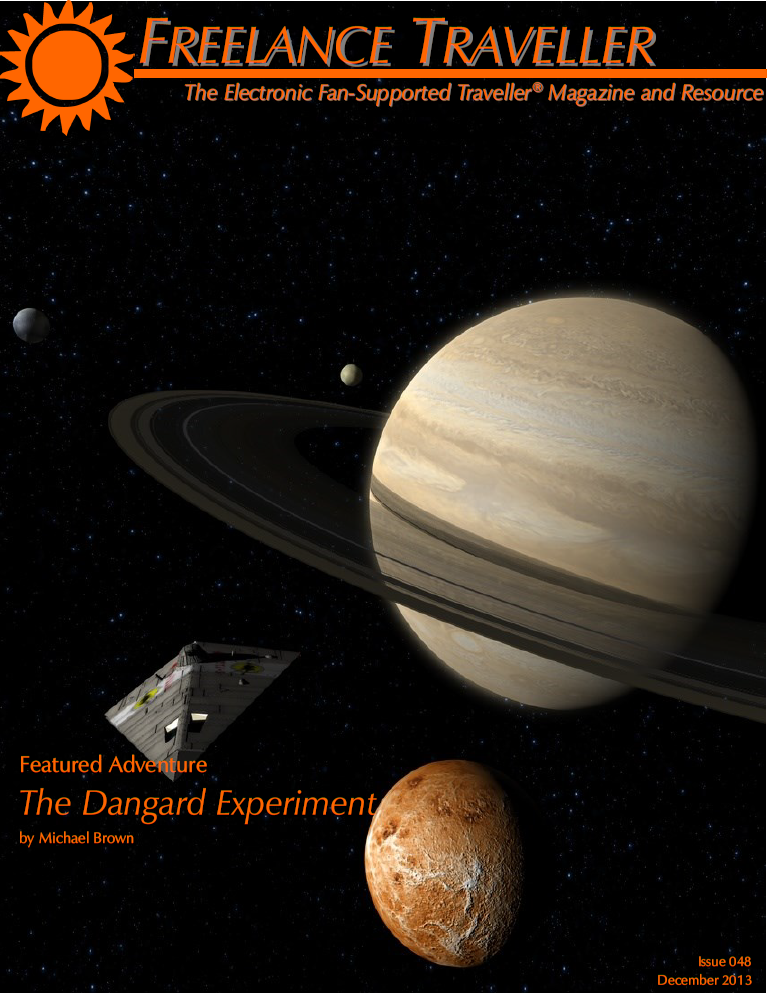| December 2013 | Department | Article Title | Author |
|---|---|---|---|
 |
From the Editor | Jeff Zeitlin | |
| Featured Article | |||
| Active Measures | The Dangard Experiment | Michael Brown | |
| Critics’ Corner | Mongoose Traveller: Supplement 13: Starport Encounters | Timothy Collinson | |
| Mongoose Traveller: The Third Imperium: Solomani Rim | “kafka” | ||
| Kurishdam | Lecture Hall and Library: Calendars in Charted Space | Jeff Zeitlin | |
| Active Measures | Getting Off the Ground: Cadre Ticket | Dan Long | |
| Raconteurs’ Rest | Drop Out [Part 26] | Ken Murphy | |
| Doing It My Way | Redefining Hull Characteristics for Traveller: The New Era | Ian Malcomson | |
| Confessions of a Newbie Referee | #6: Handouts | Timothy Collinson | |
| In A Store Near You | The Showroom: Donnington-class Motorcycle | Ewan Quibell | |
| The Shipyard | Mongoose Traveller Designs: Pierreich-Fenac-class Orbital Security Boat | Keith Tims | |
Download this issue: ANSI A (US Letter) format or ISO A4 format
The articles listed and linked above are also linked in their appropriate sections of our website.
From the Editor
Last month, I discussed “New Wave” SF, the phenomenon of the “Mary-Sue”, asserted that the player-character in any RPG was, in a sense, ‘the ultimate “Mary-Sue”’, and closed by saying that Traveller gives the player more leeway to play a character whose prior career conformed more closely to the player’s tastes and inclinations.
The leeway comes from the very design of Traveller’s character generation system; the point is less to build a “Scout character” (or a character specifically from any other service, including ’Other’) than it is to build a set of skills. Careers offer more than that—they serve as a framework to hang a character biography on, for example—but it’s principally the skills that are used in play, and if you get into a situation where using a handgun is necessary to salvage the operation, it doesn’t matter whether you got the handgun skill from being a Marine or being a Law Enforcer.
The conformance to the player’s tastes also comes from the design of the system—it is normally the player who chooses the character’s career, and often the specific track through the career. Sometimes, house rules can even grant the player extra control over specific skills gained, and then, of course, there are the wide variety of third-party and ‘house’ careers as well. All this, taken together, enables the ‘ultimate “Mary-Sue”-ness’ of characters.
So how is the player-character ‘the ultimate “Mary-Sue”’? “Mary-Sue” characters are most often seen when authors insert themselves into badly-written fan fiction, usually as the character that manages to heroically solve the problems, or at least deliver the key insight and earn the eternal gratitude of the hero. Player-characters are in the campaign to solve problems—the campaign is, after all, a series of problems seeking solutions. I have known very few campaigns where the players could and would take the time to analyze how the character would act, divorcing the decision from themselves; rather, the general case was that the player was reacting, and using the character as an ‘alter-ego’—not really asking “how would a trained and experienced Marine react in this situation?”, but “how would I react if I had these skills in this situation?” That’s the essence of the “Mary-Sue”—self-insertion—and I’d say that it’s both inevitable, and necessary if the game session is going to be fun.
I’ve discussed this as though Traveller is unique in allowing this. To some extent, all role-playing games have the “Mary-Sue” factor, but what really makes Traveller the game that stands out in this respect—in my opinion, anyway—is the whole ‘plausible realism’ thing. Moreso than in other games, it’s possible for the player to visualize himself in the situation, and apply not just the character’s skills, but the player’s own direct experience and knowledge—even though you’re ‘not supposed’ to do that if the character wouldn’t have that knowledge or experience. Doing so, though, makes the Traveller experience even more ‘immersive’—it’s you that’s doing it, not your character—which also adds to the fun.
 Freelance
Traveller
Freelance
Traveller